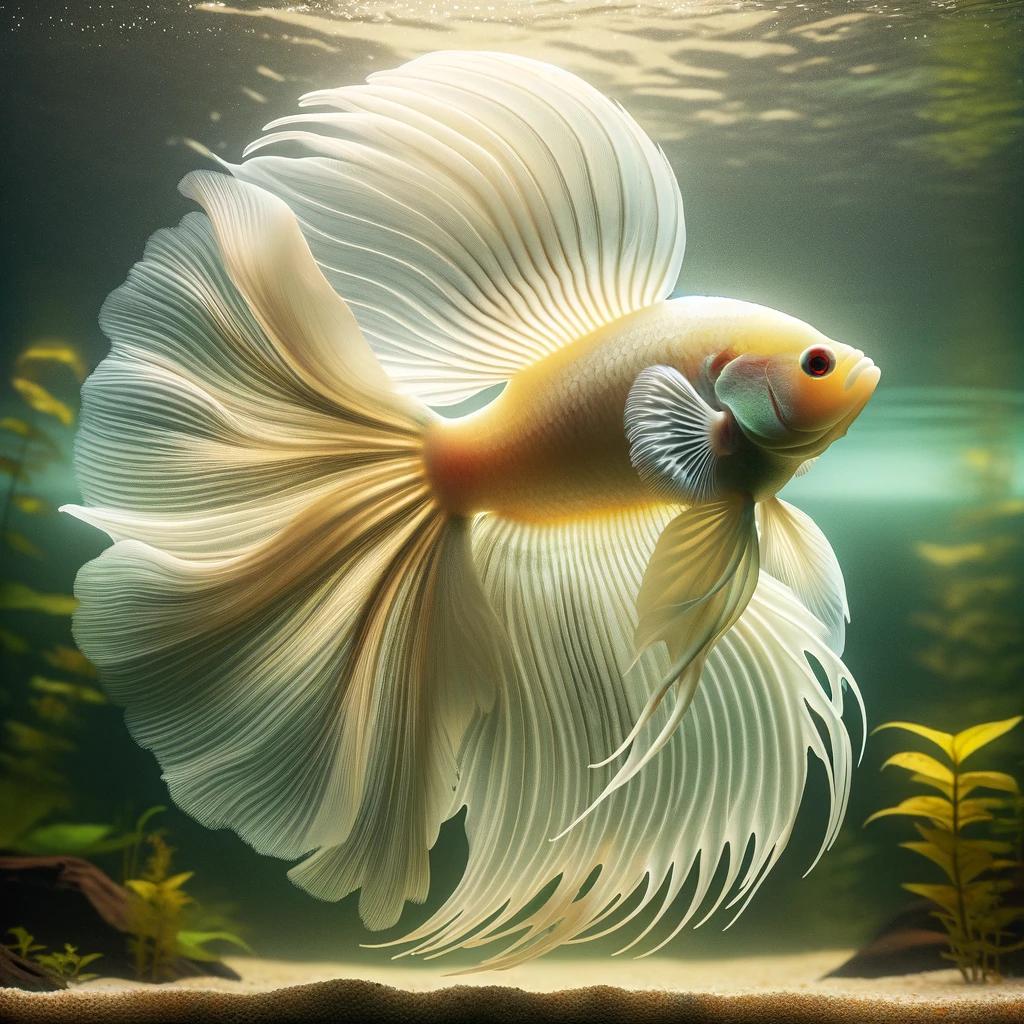Oscar fish, with their lively hues and spirited characters, are truly enchanting, becoming a top pick for those passionate about aquariums. But owning one isn’t all about the spectacle; it requires understanding their specific needs and creating an environment where they can thrive. Embarking on the journey of Oscar fish guardianship, this piece meticulously navigates the establishment of an optimal aquarium to tackle prevalent health concerns. You’ll learn how to extend your finned friend’s lifespan through proper diet and habitat management. Moreover, we’ll delve into the rewarding yet demanding journey of nurturing these underwater behemoths, guiding you in determining whether an Oscar fish is a suitable addition to your home aquarium.
Table Of Contents:
- AI illustration of a Veil Tail Oscar
- Oscar Fish Variations
- Understanding Oscar Fish Requirements
- Setting Up the Perfect Habitat
- Common Health Issues in Oscar Fish
- Pros and Cons of Keeping Oscar Fish
- Oscar Fish Need Space
 AI illustration of a Veil Tail Oscar
AI illustration of a Veil Tail Oscar
Oscar Fish Variations
When considering adding an Oscar fish to your aquarium, exploring the diverse range of varieties available is fascinating. These charismatic creatures are known for their intelligence and personality and the unique color patterns and types that make them stand out in any aquatic environment.
Common Varieties of Oscar Fish
The most popular varieties among pet owners include the Tiger Oscar, Albino Oscar, and Red Oscar. Each variety has its distinct appearance:
- Tiger Oscars are admired for their vibrant orange and black markings reminiscent of tiger stripes.
- Albino Oscars, with their striking white bodies and red eyes, offer a stark contrast to more traditional colors.
- Red Oscars, showcasing varying shades of red against a darker background, provide a splash of color to any tank.
Besides these common types, there are several other variations, such as Lemon Oscars or Veil Tail Oscars, which might be less commonly found but can still make captivating additions to home aquariums.
Rare Varieties That Are Prized by Owners
A few rare varieties have captured the hearts of oscar fish enthusiasts due to their unique appearances. Among these prized specimens are:
- The Blueberry Oscar showcases intriguing blue hues mixed with traditional Oscar patterns, making it highly sought after by collectors. Learn more about Blueberry Oscars here!
- Lutino Oscars exhibit stunning yellow-to-gold scales that seem almost translucent under light – truly mesmerizing sights in any setup. Discover Lutino Oscars here!
- The Long-Finned Oscars stand out due to their dramatically elongated fins, which give them an elegant appearance unlike any other type. Read More on long-finned Oscars here!
Diving into the world of Oscar fish varieties offers endless possibilities for customization and personalization within your aquarium setting. Whether you’re drawn to the classic looks or seek something more unique, there’s an Oscar fish type out there for everyone. Remembering to research specific care requirements for each variety will ensure a healthy and vibrant aquatic environment for your new finned friends.
Understanding Oscar Fish Requirements
Oscar fish, with their vibrant personalities and striking appearance, are like the rock stars of aquariums. But even rock stars need proper care to shine.
Setting Up the Perfect Habitat
Oscar fish are like aquatic divas, demanding their space but rewarding you with their vibrant personalities. Your tank setup is critical to keeping them happy and healthy.
A massive part of Oscar’s care revolves around water quality. These guys produce a lot of waste, so strong filtration is non-negotiable. Think about it as setting up a luxurious spa for your finned friends—a place where the water is always pristine.
Then there’s the matter of size. Starting with at least a 55-gallon tank gives your Oscars room to strut their stuff without bumping into walls or each other. But remember, bigger is always better in the world of Oscars. This guide on Oscar fish care emphasizes that spacious environments reduce stress and aggression in these territorial creatures.
Last but not least, consider decor carefully. While Oscars love rearranging their surroundings—often seen as interior decorators of the aquarium world—they also appreciate hiding spots for some alone time away from prying eyes (or tank mates).
The Lifespan of Oscar Fish
But before you get too attached, knowing that these charismatic creatures typically live for 10 to 12 years under optimal care conditions is important. Yes, when treated right, they’ll stick around long enough to become a significant part of your life.
The duration of an oscar’s existence is swayed by myriad elements, ranging from their living conditions to the care they receive. Top-notch water quality is non-negotiable; think crystal clear and well-filtered. Their diet also plays a huge role – Oscars thrive on variety but require nutritionally balanced meals tailored to large carnivorous fish. Regular tank maintenance and monitoring for signs of stress or disease further ensure your aquatic buddy enjoys a full life.
To dive deeper into creating the perfect environment for your Oscar fish, Fishkeeping World offers comprehensive guidance. This guide delves into all aspects, from picking compatible companions to grasping their specific nutritional requirements – essential actions for preserving their well-being and extending their lifespan.
Common Health Issues in Oscar Fish
Oscar fish dazzle us with their lively spirits and vivid hues, making them a marvel in any aquarium. But they’re not just pretty faces; these aquatic characters can run into health snags if we’re not careful.
Hole in the Head Disease
Unfortunately, this scary-sounding condition is common among Oscars. It starts with small pits on the head and can escalate quickly without intervention. Poor water quality or nutritional deficiencies often trigger it. Maintaining pristine tank conditions and offering a varied diet is key to combat this.
Exploring the intricacies of a hole-in-the-head disease, we uncover that spotting it early on can significantly alter its impact. Watch for lesions or depressions on your fish’s forehead as an early warning sign.
Fungal Infections
Are fuzzy patches appearing on your Oscar? If you notice some fuzzy spots on your Oscar, you might be dealing with a fungus issue. These infections thrive in less-than-ideal water conditions, so keeping your aquarium clean is paramount here, too.
Treating fungal issues usually involves antifungal medications specifically designed for fish use — but prevention always beats cure. Regular tank maintenance goes a long way toward stopping fungi before they start.
Pros and Cons of Keeping Oscar Fish
Oscar fish, with their personable nature, can turn any tank into a bustling underwater city. But just like choosing to live in the heart of New York has its ups and downs, so does deciding to share your space with these aquatic characters.
The Upside: Personality Plus
With their engaging demeanor, oscars truly bring a dynamic vibe to the tank. They’re not just fish but companions who’ll recognize you as part of their world. Watching them rearrange their tanks is like having an interior designer who works for free—except they use rocks instead of furniture.
Their palates are as diverse as ours, relishing a range from store-bought pellets to the crisp freshness of vegetables. Ensuring their diet is engaging and nutritionally balanced requires a keen eye for detail.
The Downside: High Maintenance Required
But here’s the catch: Oscars need spacious tanks—at least 55 gallons—to roam freely. They produce more waste than smaller fish, making top-notch filtration systems and regular water changes non-negotiables for keeping their environment clean and healthy.
Their bold personality comes with a penchant for redecorating too often by moving things around in the tank, which means you might find your carefully arranged aquascape turned upside down overnight.
Oscar Fish Need Space
Owning an oscar fish means diving deep into their world. You’ve learned they need a specific habitat to flourish and the right diet to stay healthy.
Ensuring they flourish is not merely about providing sustenance; it entails sculpting an environment that fosters their development, curiosity, and dynamic essence.
Their lifespan shines a light on how well we care for them. Remember, common health issues are preventable with vigilance and proper tank management.
In essence, crafting an ideal habitat for your oscar fish is paramount. It demands effort, patience, and, most of all, an understanding of what makes these aquatic giants tick.
So if you’re ready to take on the challenge and rewards of keeping an oscar fish, you’re stepping into a journey that’s as colorful as they are!


